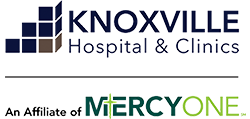KNOXVILLE, IA – The new year brings the opportunity for a fresh start, and your health is always an important priority to have going into a new year. Annually, about one in four Americans make New Year’s resolutions with many individuals expressing a desire to exercise more, improve their diet, and lose weight. With so many people including health and wellness into their resolutions, the experts at Knoxville Hospital & Clinics (KHC) share their tips to help create healthy habits.
Schedule annual health screenings
One way to maintain a healthy lifestyle in the new year is by scheduling an annual physical exam with your health care provider to make sure you are up to date on your screening labs, preventative screenings, and immunizations.
“Early detection and regular monitoring can identify potential issues before they start, and early detection of illnesses often leads to more treatment options,” says KHC family medicine provider JB Law, DO.
Health screenings are important for people of all ages, but the screening tests may vary based on your age. Your health care provider should perform some of these screenings at your annual wellness visit, and there are others you should routinely perform throughout your life span.
If you do not see a health care provider regularly, this is a good time to start establishing a baseline with your provider. “The more we know about you, the better we are able to tailor treatments best for you,” said Law.

There are many health screening tests that are age-specific and may not be needed every year. KHC family medicine provider JB Law, DO, recommends health screenings by age based on guidance from the US Preventative Task Force and Services.
Ages 21-40:
- Annual wellness check including mood and blood pressure checks.
- Age-appropriate vaccines including Flu, HPV, COVID.
- Women should begin having a pap smear at age 21.
- Screening labs depending on family history and medical problems.
Ages 40-65:
- Annual wellness check.
- Age-appropriate vaccines including Pneumococcal, Flu, and COVID.
- Most women should begin having an annual mammogram at the age of 40; earlier if there is a family history of breast cancer.
- Men should begin prostate screenings at age 50.
- A colonoscopy should be done at age 45; earlier if there is a family history of colon cancer or other bowel diseases.
- Screening labs depending on family history and medical problems.
Ages 65+:
- Annual wellness visit.
- Age-appropriate vaccines including Pneumococcal, Flu, and COVID.
- Men and women should have a bone density study every two to five years.
- A colonoscopy should be done every 10 years.
- Screening labs depending on family history and medical problems.
Eat Right
At the start of the year, people think about making drastic changes to their diet. Instead of focusing on unrealistic expectations, KHC Registered Dietitian Laurynn Verry recommends people see what is sustainable over time.
“A nutritious diet is a lifestyle choice,” said Verry. “It is sustainable because you’re not depriving yourself.”
Eating a nutritious diet is about so much more than losing weight. Your diet can affect your risk of developing chronic diseases, your longevity, and even your mood.
“A nutritious diet does not mean restriction – it means learning how to eat healthfully while still incorporating all of the foods you love into your life,” added Verry.
Verry also recommends cooking at home instead of eating out.
“Not only can it be fun, but you can also control the amount and type of ingredients you put in your food,” she said. “Engaging in healthy choices should be a goal every day, not just at the start of a new year.”
Want to eat healthier – but do not know where to start? KHC Registered Dietitian Laurynn Verry shares these tips.
- Eat more fruits and vegetables. They make for the perfect side dish or snack.
- Use fresh ingredients. This helps prevent the use of packaged foods which can be especially rich in sugars, fats, and salt. However, don’t get caught up on only using fresh – you can also use frozen or canned ingredients. Look for canned veggies labeled ‘low sodium’ or ‘no salt added’ and canned fruit in 100% fruit juice.
- Eat before you feel famished. If you wait too long to eat, you might reach for things you were not planning to have just because you are hungry. Take the time to keep healthy snacks in the refrigerator or accessible at work.
- Stay hydrated. Aim to drink 64 ounces of water per day. Drinking plenty of water throughout the day can boost your metabolism, help the body break down food properly, and can be beneficial for your overall health.
Exercise Regularly
Worried about exercise? Remember, every person is not cut out to be a pro athlete. Go easy on yourself!
“Exercise doesn’t have to mean going to a fitness center,” said 21st Century Rehab/KHC Physical Therapist Jessica Stickel. “Instead, it could mean parking your car a bit further away at work or the grocery store than you normally would.”
Staying physically fit has numerous benefits, including boosting cardiovascular and muscular health and fighting disease. Exercise can also positively affect your mental well-being by helping the body relieve stress and reduce depression. Protecting your mental health has been especially critical during the stress of the pandemic, so try to get the American Heart Association-recommended 150 minutes of moderate-intensity aerobic exercise each week.
One way to get regular exercise is to encourage others to join you. Stickel said the buddy system can be helpful to hold yourself accountable.
“Get your spouse or your kids involved, and even your friends,” she said. “Maintaining a healthier lifestyle shouldn’t be something you force yourself to do. Instead, it should be something that you want and enjoy doing.”
21st Century Rehab/KHC Physical Therapist Jessica Stickel shares some simple ways to break exercise down into 30-minute increments:
- Take a least two 30-minute walks a week at lunchtime or another part of your day.
- Do 30 minutes of strength training with a kettlebell or hand weights while watching TV.
- Jump rope for 15 minutes when you get up in the morning and again when you get home at night.
- Do squats for 10-minute increments three times throughout the day.
Knoxville Hospital & Clinics is a non-profit community hospital serving Marion County and the surrounding area. Named a “Top 100 Critical Access Hospital” and voted as Best of Red Rock Area’s “Best Place to Work” and “Best Hospitality”, KHC’s highly skilled medical staff and specialists provide personal, compassionate and innovative quality health care to patients. For more information regarding this release and other happenings at Knoxville Hospital & Clinics, call Public Relations at (641) 842-1485.

